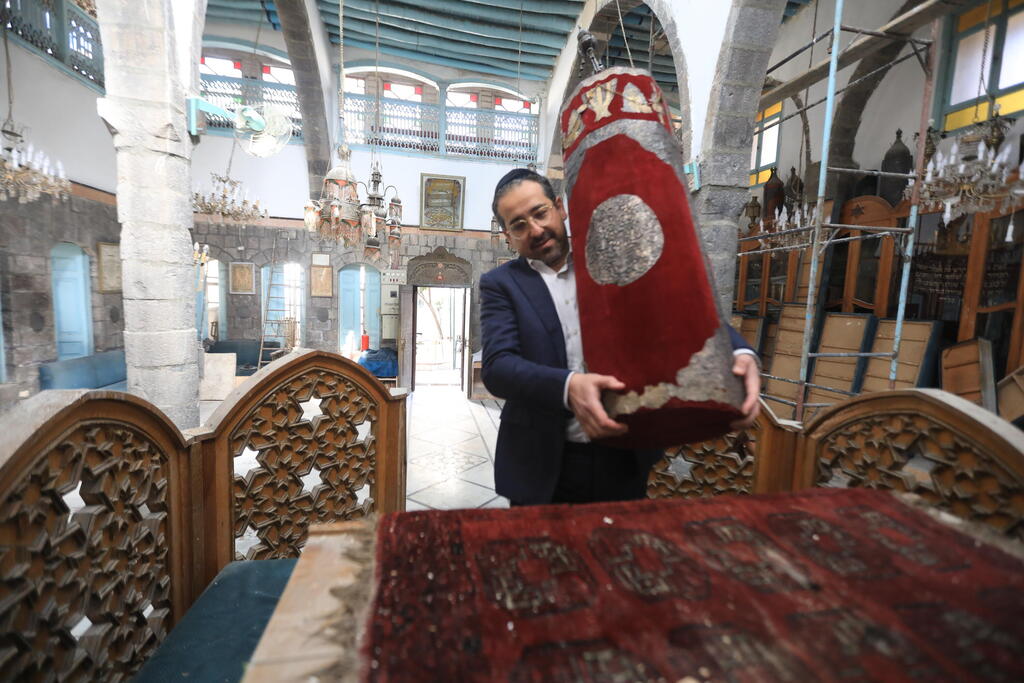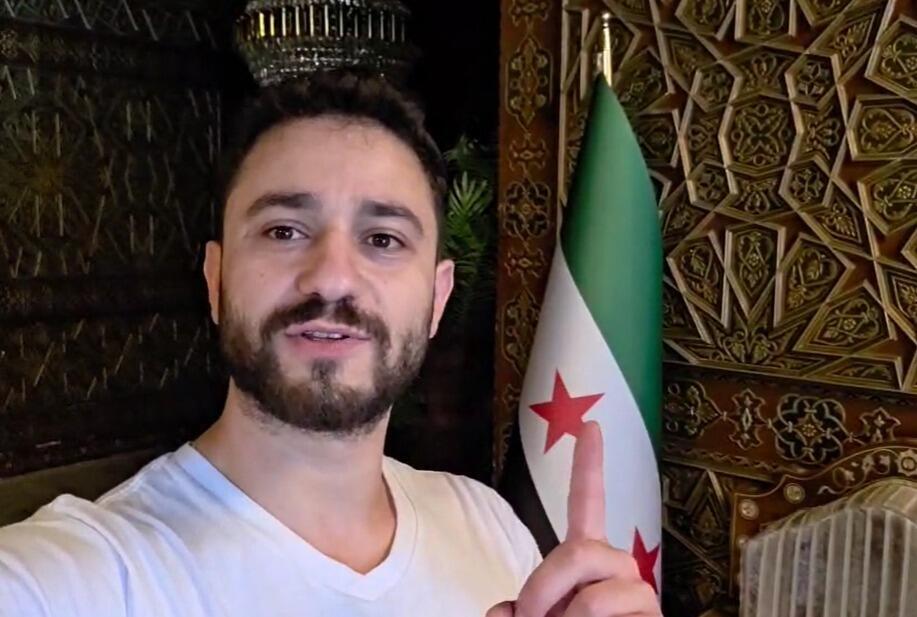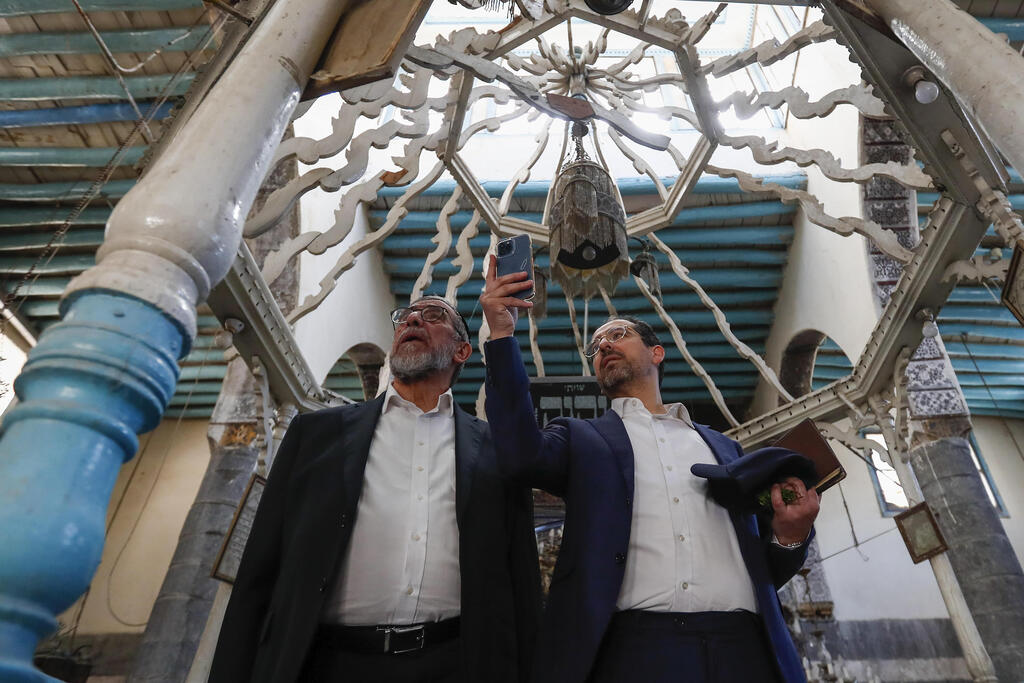A group of Jewish visitors from the United States arrived in Damascus earlier this week, marking a significant return for Syrian Jews amid a fragile post-war reconstruction process in the country. The delegation, which included four Jewish individuals traveling from New York with a stopover in Istanbul, was part of a larger group that also included Muslims. One member of the group, Joseph (Joe) Jajati, a Syrian-American Jewish businessman, spoke with Ynet during his time in Syria, detailing his experiences and reflecting on the delicate state of Syria’s Jewish community.
The trip is not the first for Jajati, who has been visiting Syria regularly since 2018, when Bashar al-Assad was still in power. He explained that he makes the journey every two to three months, staying for about 20 days each time. “For me, it’s important to maintain connections to my roots,” Jajati said. “But Syria is a place with many changes, and the future of the Jewish community here is uncertain.”
(Video: Joseph (Joe) Jajati)
Jajati’s visit comes as reports indicate a renewed effort to strengthen ties between the Jewish community abroad and the new Syrian regime. During his time in Damascus, Jajati met with several local officials and observed a level of confusion within the regime about how to engage with the Jewish community, particularly those who have left the country.
“The new regime is trying to understand the Jewish community outside Syria,” Jajati noted. “But not all Syrian Jews agree on what needs to happen. There are different factions, and each one has its own agenda.”
One issue that has particularly concerned Jajati is the future of Jewish properties and heritage sites in Syria. With so many Jews having fled the country over the years, there are questions about who will control these sites moving forward. Jajati strongly believes that it should be the Jews who remain in Syria who hold the keys to the synagogues and other Jewish sites, not those who have left the country.
“It’s painful to see people trying to exploit this situation for personal gain,” Jajati said. “The ones who stayed should be the ones to protect these places. They should hold the keys, so when someone comes to visit, they can open the doors.”
Throughout his trip, Jajati met with a variety of Syrian officials and said he heard positive feedback regarding the Jewish community. “I’ve only heard good things,” he said. “I hope it’s sincere. But the regime seems confused, especially when it comes to the Jewish community outside Syria. They see us as separate groups with different views.”
Jajati also touched on the broader picture of Jewish relations with Syria, mentioning that while visits were possible during Assad’s regime, the situation has evolved somewhat in recent months. “For those of us with ties to Zionism, it might be easier to enter Syria now,” he said. “For others, it’s much the same as before.”
When asked about his views on Israel and its relationship with Syria, Jajati confirmed that the topic had come up during discussions with Syrian officials. However, he stressed that it was approached in a low-key manner without any in-depth conversation.
“I don’t think anyone wants war,” Jajati said. “People just want to live peacefully, no matter where they are.”
The visit comes amid reports that other members of the Syrian Jewish community are returning to the country for brief visits. In February, Rabbi Yosef Hamra and his son Henry, who left Syria for the United States in the 1990s, returned to Damascus. The pair became the first in decades to read from a Torah scroll at a synagogue in downtown Damascus, marking a symbolic return to the country’s Jewish roots.
During their visit, the Hamras met with the Syrian Deputy Foreign Minister, who reassured them that the government was committed to preserving Jewish heritage in the country. Rabbi Hamra and his family now reside in New York.
Syria is grappling with internal and external challenges as it rebuilds following years of conflict. The regime has pledged to unite all segments of society, but violent incidents targeting minority groups, including Christians and Kurds, continue to raise concerns. While the government denies any involvement in these attacks, some victims have reported that the assailants are connected to the new regime.
Get the Ynetnews app on your smartphone: Google Play: https://bit.ly/4eJ37pE | Apple App Store: https://bit.ly/3ZL7iNv
Israel’s relations with Syria remain tense, with Israel continuing operations in Syria’s buffer zone since the fall of Assad’s regime. In recent days, the Israeli military has carried out airstrikes in Syria, claiming the need to protect the Druze community from armed groups operating near the border.
Jajati, for his part, remains hopeful for a future of peace in the region, a sentiment he shared with Israeli citizens in his message: “Enough with the war. People just want to live. They want peace.”







